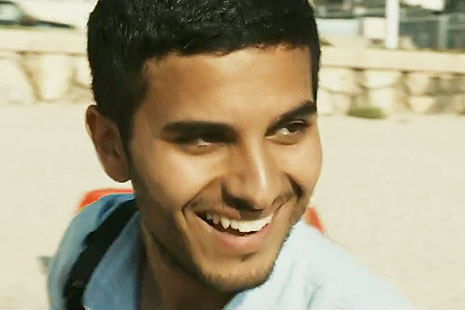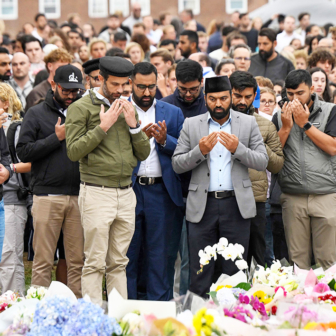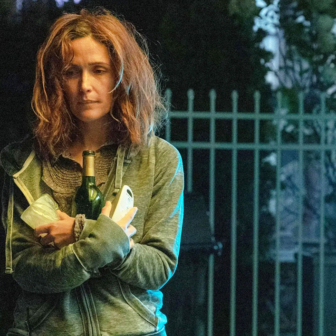THE French film Le fils de l'Autre, currently in circulation as The Other Son, has been dismissed in various critical quarters for reasons which are of some interest in themselves. Because of its reservedly hopeful view of Israel–Palestine relations, it’s been put down as a superficial, feel-good exercise; Slant magazine’s respected critic Chris Cabin wrote that while there might be hope for peace with younger generations, “another sentimental film made by a blatant outsider doesn’t make this hope any clearer or convincing.” He misreads; he also fails to listen to the film, in which dialogue is conducted in four languages, Arabic, Hebrew, English and French. Lorraine Lévy’s winning lightness of directorial touch isn’t sentimentality; the intractable problems are not shortchanged. If there’s a smear of soap at the end, a certain comedy rescues it. More importantly, she is not an outsider. It could be argued that when it comes to the Israel–Palestine conflict, nobody is; the tension is registered in one way or another in every Western community. In this film, however, France is recurrently present offscreen; with Israel and Palestine, it works as an operative third term. One of the two young men at the centre of the story has been studying in Paris; returning, he brings in the consciousness that there are wider worlds from which to think about his life as a Palestinian – or an Israeli – and he has to work out which of those he is.
The film is built from the ancient plot device of switched identities – go back to The Comedy of Errors and its sources in antiquity. Two male infants, born in Haifa on the same day in 1991, are evacuated during a Scud bombardment, then handed back to their supposed parents; the Jewish couple’s son is raised in a Palestinian family, the Palestinian child by Israelis. When they reach eighteen, and the supposedly Jewish son must prepare for military service, a blood test triggers investigation; the truth comes out, and all concerned must deal with it. Here we’re called on to suspend disbelief, as the fable solidifies into realism in real settings. In the tense, austere sequence in which a doctor brings the two couples together and offers the hospital’s inadequate, long-overdue apology, the film takes off from its moorings. The doctor sets out to explain in Hebrew, but the Palestinian couple won’t understand; he continues in English, which is the language generally used by both of the young men (“you’ve got my life – don’t mess it up”).
Thus two decent, ordinary families, cast by history as opponents in a seemingly deadlocked struggle, must engage with each other through their children. Nothing could be harder, since they are quite literally on opposite sides of the fence, the massive concrete wall that cuts through communities, separates workers from workplaces, friends from friends and kin. It is seen recurrently in the film, not to force political points but as a grimly inescapable part of the environment. The stages of the story are marked by passages through the checkpoints, where the guards treat Israelis and Palestinians rather differently. Israeli teenagers disport happily on a beach, where we can see the Tel Aviv Sheraton in the background; there, Joseph (Jules Sitruk), the young Palestinian who has grown up as a Jew, moves away from his contemporaries to struggle with the news. The depth of the problem, and the force of Jewish identity, emerge in his interview with the rabbi (Ezra Dagan). The Palestinians’ supposed son Yacine (Mehdi Dehbi) returns from study in Paris to discover that he is in fact Jewish.
The French–Israeli mother, Orith (Emmanuelle Devos), is seen running her medical practice, and, when she wants time to think, walking out on a pier to watch the waves: images of freedom and authority unavailable to her Palestinian counterpart, Leila (Areen Omari). They make friends, however, with an ease that’s impossible for their husbands, and despite the manifest inequality of households and living conditions; we’re given a strong sense of the ramshackle lanes and cramped quarters in the homes of the West Bank. The Palestinian father, Said Al Bezaaz (Khalifa Ntour), is an engineer who can’t get professional work inside the fence, and consequently works as a car mechanic. Sharing an uneasy social visit with Orith and Alon (Pascal Elbé), an Israeli military officer, Said breaks into rage; the word occupation is used. Later, the men move into a stop-start process toward co-existence – there’s little prospect of friendship. They’re seen sitting, in wordless discomfort, over coffee. That emotional gulf; the men’s struggle to deal with it; the anger of Leila and Said’s older son Bilal, who feels not only the loss of the brother he thought he had, but also a deep sense of betrayal – all these build an account in which none of the problems are softened or abbreviated.
The mistranslation in the title becomes pertinent: Le fils de l’Autre (with a purposeful capital A) means not “the other son” but “the son of the Other,” and that’s rather different. It sets the viewer in a strange double position, a kind of suspended ambiguity; she must try to look on that otherness from both sides, and also from within its force-field of questions. She is sitting in an audience in this Western country where pro-Palestinian expression, even when it comes from respected academics, can incite charges of anti-Semitism and quite vicious abuse; where Australians of Middle Eastern origin are subjected to taunting and violence; and where the first Australians themselves are – still – marginalised, impoverished and derided. The film invites a liberal, humane response, and some proper discomfort as well. We note, repeatedly, that there’s no way you could sit on that fence; it’s topped with coiled razor wire from end to end.
MIRA NAIR’s The Reluctant Fundamentalist was written, in part, by Mohsin Hamid, whose novel was the film’s groundwork. In a cafe in Lahore, handsome young Changez Khan (Riz Ahmed), caught up in a high-profile kidnapping, sets out to tell his story to an American journalist, Bobby Lincoln (Liev Schreiber). The privileged son of an esteemed Pakistani poet, Changez found his way through Princeton to a financial world mentor (Kiefer Sutherland) and thus to a promising Wall Street career. Sutherland does a great job projecting the certainties, and the half-masked unease, of the masters of the universe (from his part of the story, go back and take another look at the documentary Inside Job; it’s around on DVD, and very much worth having). Then the twin towers fell, and as a Muslim abroad, Changez found himself harassed, arrested on no pretext but his appearance, strip-searched and humiliated; and his American girlfriend (Kate Hudson) disastrously underestimated the effects of anti-Islamic stereotyping. Here, a certain sexism threatens; she is guilty of American cultural blindness, while it’s the young man who takes the ethical journey. As he must; in the present of the film, Changez is back home, entangled in events, teaching and questing, a kind of prodigal son.
The central dynamic is in his complex interplay with Bobby in the cafe, where each has reason to doubt the other’s credentials; perhaps Changez really is, or could become, a terrorist; perhaps – a lot more likely – Bobby is really working for the CIA. The Lahore marketplace mills around them, vibrant, overcrowded, vivid; in stark contrast, the New York offices are glassy and cold. All a bit simplistic, too much of us-and-them, and it’s not surprising that American critics have attacked the film for heavy-handedness. With Islamic religious fundamentalism in play, Nair poses the notion that there’s another kind of fundamentalism, that of capitalist money markets; Changez has refused that one too. The suggestion of a conceptual symmetry doesn’t really work; the worlds are too far apart. But the film is still a noisy, commanding entertainment. Mira Nair films from the Indian diaspora, looking across and back from west to east; it’s a very powerful storytelling position.
IN THE Portuguese Miguel Gomes’s Tabu, story and allegory entangle in beautiful black and white. In the first section, “Paradise Lost,” aged gambling addict Aurora (Laura Soveral) is found in terminal illness and distress; her long-ago lover appears to return; her vanished daughter will not. Here, in present-day Lisbon, there are strong presences around her, a black African servant called Santa (Isabel Cardoso) and a concerned neighbour, Pilar; the latter, for whom Aurora’s plight supplies her need for a role, is made a particularly interesting character by Teresa Madruga.
“Paradise Lost” was shot in 35 mm; the second section, “Paradise” comes from further off, in 16 mm, and therefore has a different kind of beauty. There’s a crocodile watching in a river, and an African estate below a mountain named Tabu. The old lover, Ventura (Henrique Espírito Santo) recalls the story of his adulterous love affair with the young Aurora (Ana Moreira); his own younger self (Carloto Cotta) evokes all the stories he belongs to, wearing pith helmet, old-time explorer’s gear and an Errol Flynn moustache. Music and natural sounds are heard, while dialogue is silent. Memory and history take over; we don’t get back to Lisbon. It’s as though the end of colonialism meant the end of Portugal too, and Portugal is condemned to remember.
Tabu has divided the critics, not all of whom are cinephiles. Some saw it as so much overwrought home movie; they fail to imagine how the lengthening past of cinema can be called back to serve new perspectives in the present. In a rather struggling interview (seen on ABC1’s At the Movies on 21 May) Gomes seemed to me to be explaining his aspiration for a cinema that reaches through the visible to the invisible, one that has to do with memory, both its vitality and its possible deceits. If that was the goal, he has reached it; this is cinematic poetry and fable, release from realism into reimagined reality. •





